In the spring of 2020, city inspectors discovered hazardous wiring in a rental duplex on West Vine Street in Milwaukee and ordered the owner, Absolute Properties, to pull an electrical permit and fix the violations promptly.
For more than a year, city records show, the company didn’t do as ordered. It didn’t pull the permit, and it didn’t resolve the outstanding violations.
But the company did do one thing: It collected taxpayer money for rent.
Tax dollars in the form of rent assistance to low-income families regularly flow to landlords who neglect to fix electrical issues, a Milwaukee Journal Sentinel analysis found. Samples of data between 2018 and 2020 show that rental assistance went to the owners of at least 62 single- and two-family Milwaukee homes that had unfixed electrical violations at the time of payment, totaling nearly $200,000. The actual numbers are likely much higher.
The Journal Sentinel also found local government agencies and nonprofits that distribute federal rental assistance to landlords often do so without conducting thorough safety inspections or reviewing publicly available records online to see, for instance, if landlords have outstanding arrest warrants for failing to make repairs.
Community leaders and housing advocates said they were troubled by the Journal Sentinel's findings.
“How does that occur?” said Barbara Smith, housing coordinator for Amani United, a resident-led community group that has worked for years to improve housing conditions in the north side neighborhood. “How do you know that something is wrong on a property — because it’s in your records and it’s documented somewhere — but you're still sending the check?"
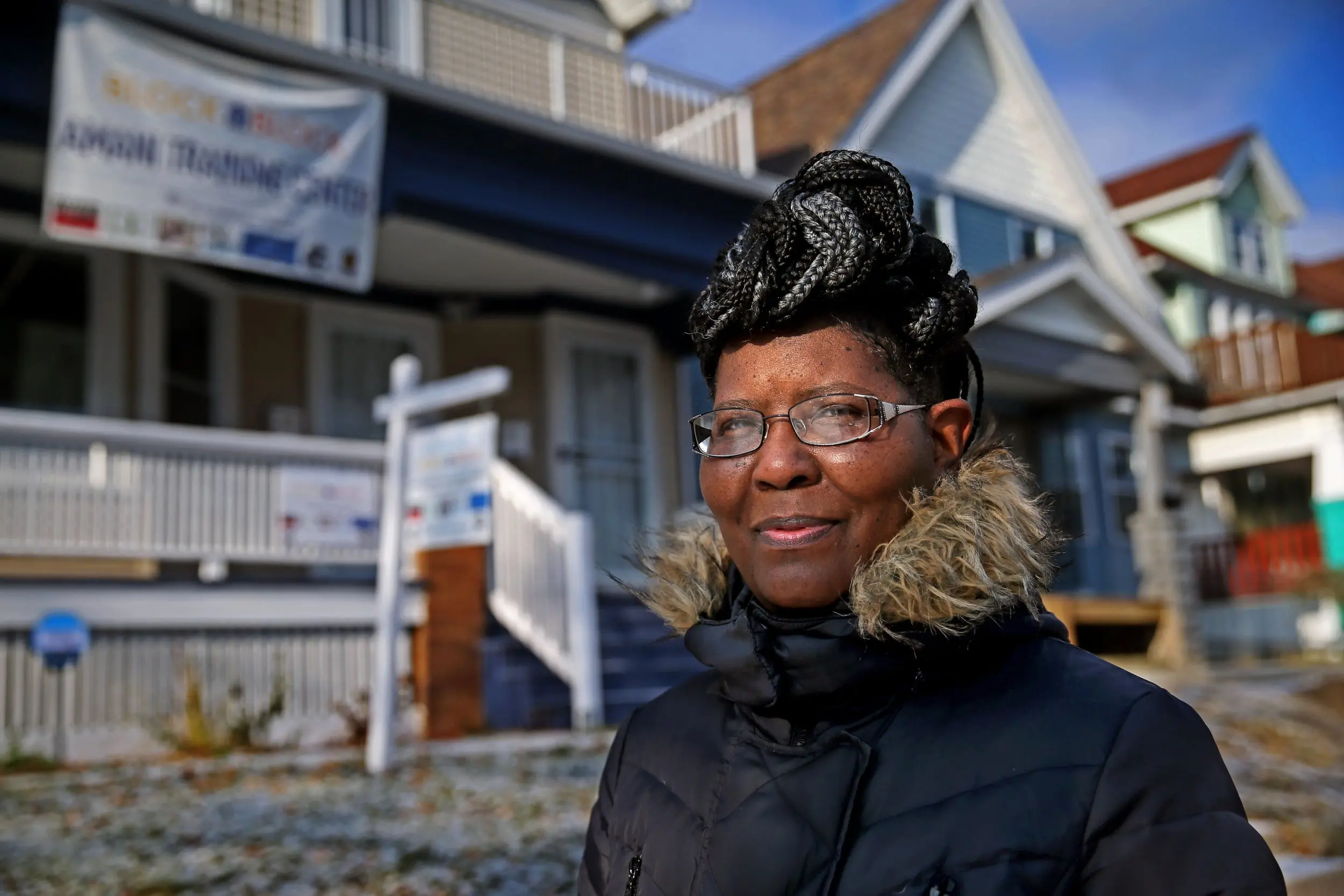
The problem of electrical fires in Milwaukee’s predominantly Black and low-income neighborhoods reveals how money and power tilt against tenants and in the favor of landlords, some of whom take advantage of an ineffective inspection system.
The risk is far higher in these areas compared with the rest of the city, the Journal Sentinel reported in August. In the 53206 ZIP code, which has the highest rate of suspected electrical fires, as many as 80% of the single- and two-family rental properties may have electrical code violations, based on a series of home inspections sponsored by the Journal Sentinel in November.
Yet landlords in low-income neighborhoods can charge steep rents for often-unsafe apartments, in part, because affordable housing is scarce, and tenants, especially those with credit trouble and eviction history, feel trapped. They must accept what they can get, they say.
The Journal Sentinel’s newest findings reveal that tax dollars are being used to pay for these overpriced and potentially dangerous rental units.
Each year, the U.S. Department of Housing and Urban Development sends roughly $51 million in rent assistance funds to the Milwaukee County Housing Division and the Housing Authority of the City of Milwaukee, which then distribute the money to landlords whose tenants qualify for the subsidy. Since the pandemic began, the federal government has also released about $70 million in emergency rent assistance to local governments, which contract with nonprofits to disburse the funds.
Although the Journal Sentinel's analysis of the samples of data suggests that only a small fraction of that rent assistance money was sent to landlords with unresolved electrical problems, the consequences of these hidden hazards can be deadly.
When contacted about the Journal Sentinel’s findings, officials at those agencies said they were unaware that landlords with outstanding electrical violations were receiving payments. But they offered no solutions for the problem.
Some of those same officials argued that adding conditions to rent subsidies, such as there being no outstanding code violations, could hurt tenants by taking aid from them. But one housing expert said providing public assistance for properties that have not been inspected for safety perpetuates a system that puts people in dangerous housing, with the government essentially bankrolling the risk.
Court records show that in March, three months after receiving a $2,000 rent assistance payment for a woman living in the duplex on Vine Street, Absolute Properties moved to evict her. She was $880 behind on her rent.

One day after the eviction, the apartment was listed on Twitter.
“$775/month,” the advertisement read. “Call us today!”
Curtis Hoff is listed in city inspection and court documents as being the owner of companies that collectively own hundreds of properties in the poorest parts of Milwaukee, including the one on Vine Street. Hoff's own house is a nearly 5,000-square-foot mansion in Mequon that is assessed at $842,900, records show.
Reached by cellphone at a Milwaukee Bucks basketball game earlier this month, Hoff said he could not talk and asked a Journal Sentinel reporter to email him questions.
He has not returned phone calls and emails since.
Hazardous electrical conditions unfixed for months
Another duplex listed to a company owned by Hoff, this one on North 22nd Street, had defective electrical wiring and was cited in September 2020 by the city Department of Neighborhood Services. The city gave the company five weeks to make the electrical repairs.
Months passed. No fixes were made, records show.

Rental assistance records show a $4,500 payment was made to the company, Accurate Properties, in December 2020, three months after the city’s order for repair had been issued and while the violations were ignored.
Serious electrical problems in the upper unit of the 110-year-old duplex went unfixed for a year. That changed in late November — but not because of any action by the city.
Galen Dumas, who was preparing to rent the unit, said he noted that several outlets didn’t work, resulting in a tangle of extension cords snaking through the apartment and feeding into surge protectors. Also, several overhead lights on the first floor and basement were broken, he said.
Dumas, 39, said he demanded that Accurate Properties fix the electrical problems before he, his girlfriend and their daughter moved in and started paying the $795 monthly rent for the three-bedroom unit.
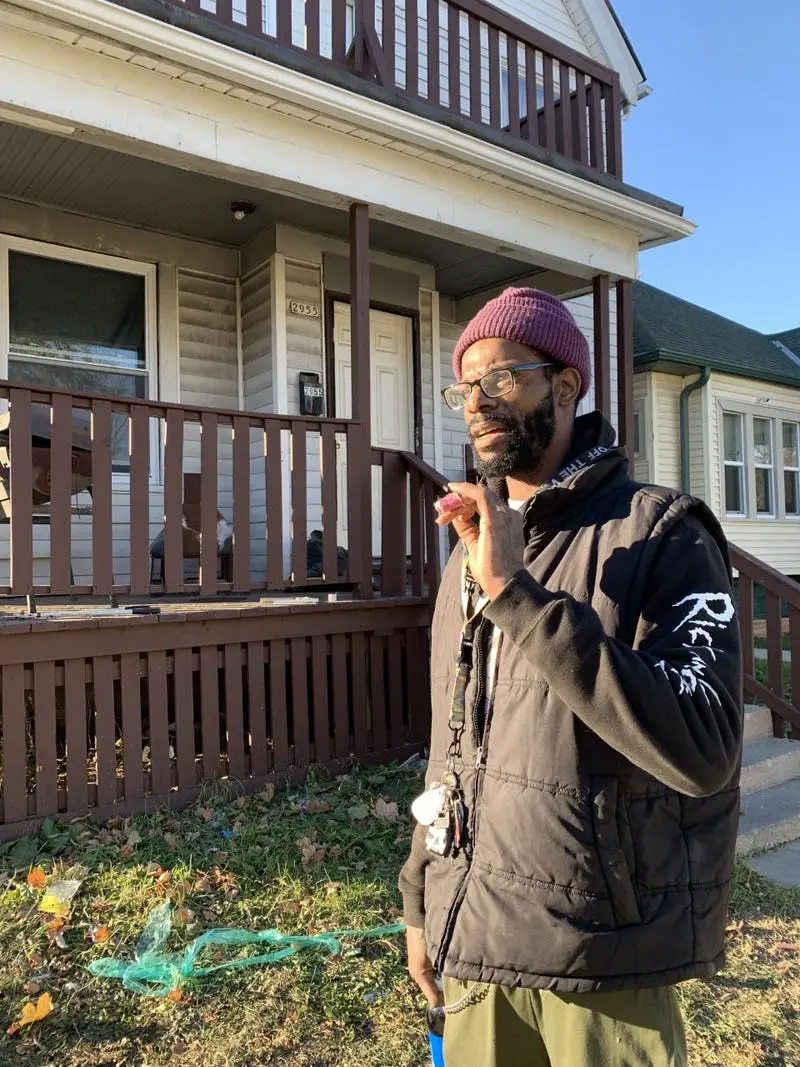
On Nov. 29, just two days before the family was to move in, an electrician arrived at the property and replaced the defective outlets and switches, according to Dumas, who then agreed to move in.
"Now every outlet and switch is doing what it is supposed to be doing,” he said.
Less than a mile and a half away, at a similar duplex off West North Avenue, Ricky Carter spotted smoke coming from the floor late one night in April.
Carter, his fiancée and her two young daughters had moved in less than six months earlier. According to Carter, the family had no idea that city inspectors had previously cited the property for multiple electrical violations. Records show the problems went unfixed for years and resulted in an arrest warrant against landlord Dominique McKinney.
As Carter and his family ran outside, they watched as fire destroyed most of their belongings. Investigators with the Fire Department suspected the cause was electrical.
One day after the fire, Community Advocates, one of the nonprofit agencies contracted with local government to distribute federal pandemic rent assistance in Milwaukee, gave McKinney $2,700, according to Shawanna Lindenberg, the nonprofit’s housing department manager. She said the nonprofit was not aware there had been a fire or a warrant for McKinney's arrest.
According to Lindenberg, Community Advocates case workers do not check whether a landlord has a warrant for unpaid violations. Those checks are not a requirement of its contract with Milwaukee County, she said.
The group does conduct in-person “habitability checks” on units that it funds, but they were suspended during COVID, according to Community Advocates CEO Andi Elliott. They resumed in November, she said.
McKinney has not responded to repeated calls from the Journal Sentinel.
Carter and his fiancée said Community Advocates never told them about the electrical problems and neither did their landlord. And the couple said they were outraged when told by the Journal Sentinel that McKinney received rent assistance after she failed to make fixes.
“I feel like the whole system failed us,” Carter said.
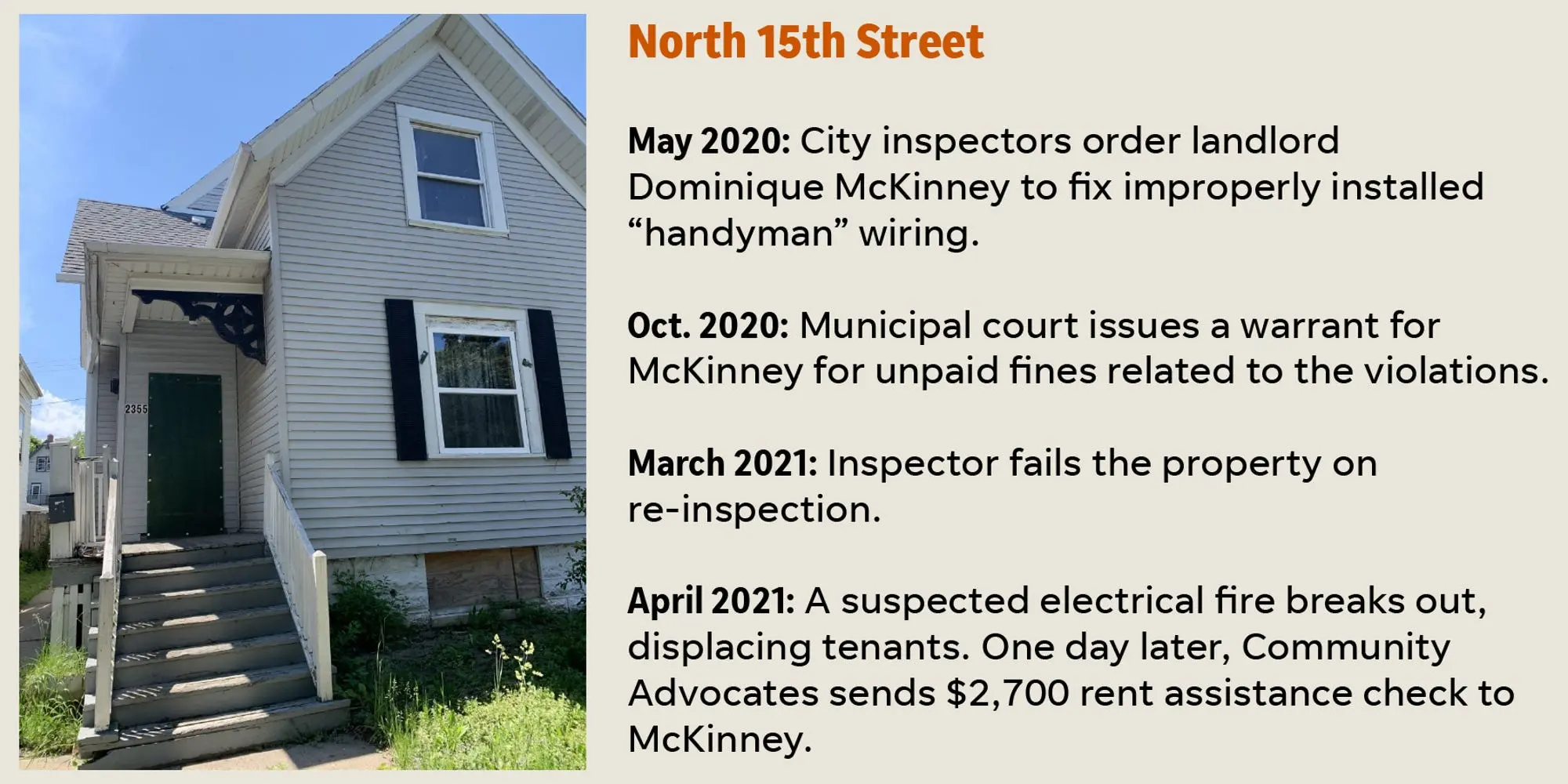
Inspections look stringent — on paper
On paper, the rules are firm: Outlets and lights must be working. Broken and frayed wiring isn’t allowed. And the electrical system must ensure safety from fire.
Those are the basic housing standards for any property to qualify for the HUD rent assistance program known as housing choice vouchers or “Section 8,” according to federal regulations.
At the local level, the protections on HUD rent assistance funds are even stricter.
Across 26 pages of regulations, the Milwaukee County Housing Division adds that “any electrical problem” that could result in shock or fire must be corrected within 24 hours. If not, the rent assistance could be withheld and the contract could be terminated.
At the city’s Housing Authority, the safety regulations are less strict than the ones at the county, but they still mandate that exposed electrical wires or sparking outlets be fixed within a day.
City and county officials say they inspect homes before rent money is distributed, but the inspections are usually limited to problems that are easily seen.
"When visible issues are detected, the county Housing Division gives landlords a date by which the issues need to be fixed or resolved," said Brandon Weathersby, spokesperson for Milwaukee County Executive David Crowley.
That's a typical approach, said Robert Dicke, the former executive director of the Dane County Housing Authority. He said inspectors will look for missing or charred outlet covers but usually won't go further, such as bringing circuit testers to check whether outlets are wired properly.
“They’re not going to move furniture and inspect every outlet. They’re not going to take covers off and check if there’s loose wires,” Dicke said. “It’s not that deep.”
In a statement, city Housing Authority spokesperson Amy Hall said renters should alert the agency about safety issues. If problems are verified, the agency will demand fixes and potentially terminate the contract with the landlord, she said.
But tenants and housing experts say it’s unrealistic to expect renters to spot wiring problems and risk retaliation for reporting their landlords to authorities.
Plus, data from the city Housing Authority shows that enforcement happens infrequently. Over the past six years, the agency terminated an average of 16 contracts per year — just 0.3% of the roughly 5,900 landlords who receive rent assistance money annually.
Rent assistance funds for tenants affected by the pandemic have fewer regulations than the regular assistance given out by HUD, the Journal Sentinel found.
Tatyana Warrick, the spokesperson for the Wisconsin Department of Administration, which passes the federal rent assistance funds to local agencies to distribute, said the pandemic funds were designed to be one-time, emergency cash infusions to prevent evictions during the pandemic.
As a result, no inspections were required, she said.
According to Warrick, the federal government prohibits local officials from using pandemic resources on repairs or putting conditions on the money.
“Requiring a landlord to come into compliance with building codes/inspections, while it may seem to make logical sense on one hand, would actually limit what assistance a renter could access by no fault of their own,” she said.
Social Development Commission, one of the nonprofits contracted to distribute pandemic rental assistance in Milwaukee, does not inspect properties before giving out money, said James Hall, an attorney for the organization. He said the group also does not check for unresolved building code violations or arrest warrants.
The Journal Sentinel’s findings that tax dollars are going to landlords who fail to fix potentially dangerous electrical violations are “shocking and terrible,” said Mitch, a housing law expert at the University of Wisconsin-Madison who legally goes by just his first name.
"It would be as if a health inspector found rats at a restaurant and said, 'Here's a whole bunch of government coupons that you can use to give out and make your food less expensive — never mind the rats,’” he said.
Mitch, who oversees the UW-Madison Neighborhood Law Clinic, which primarily serves low-income renters, said it’s possible to hold landlords accountable while still protecting tenants.
"We can have safe cars, and people still buy cars,” he said. “We can have regulations on restaurants, and we still have restaurants. We have regulations on banking, and we still have banks. Every industry has regulations, and it still survives.”
Low-income rentals are a booming business
The vicious cycle in low-income housing churns along largely due to Milwaukee’s rental ecosystem, characterized by its aging housing stock, high levels of segregation and lack of renter protections.
Landlords who are willing to exploit these factors can often recoup their cash investment in a few years, the Journal Sentinel found. There is little pressure for them to address violations. The city’s Department of Neighborhood Services lacks follow-through, and the state Legislature passed pro-landlord laws in the past 10 years that limit the ability of cities to run rental inspection programs. The changes came from a group of state lawmakers, some moonlighting as landlords.

The inner financial workings of landlords are typically tightly held secrets, but lawsuits filed by the city against several Milwaukee landlords show glimpses into the value that can be extracted from low-income renters.
Court-appointed property managers who took over the portfolio of landlord Mohammad Choudry in 2017 reported the 70-plus properties were generating $531,000 to $780,000 in rental income per year from 2017 to 2020. According to civil court records, the properties had accumulated more than 1,700 open violations. Many were dilapidated beyond repair with electrical wiring problems, caving ceilings, cockroach infestations and mold. In September, a judge ordered his properties sold or razed.
Another central city landlord, Elijah Rashaed, was bringing in even more around the same timeframe — approximately $1.3 million per year, according to court records. The disrepair in the 150-plus properties linked to Rashaed overwhelmed court-appointed property managers, who detailed years of neglect, including faulty electrical systems, broken furnaces and rotted pipes.
Housing and economics experts say this is not an accident or a tragedy but a purposeful business model of certain property owners.
It’s a peculiar puzzle of Milwaukee’s poorest ZIP codes: The rents are shockingly high. Landlords are able to charge comparatively exorbitant rents even on houses that they may have bought for relatively small amounts.
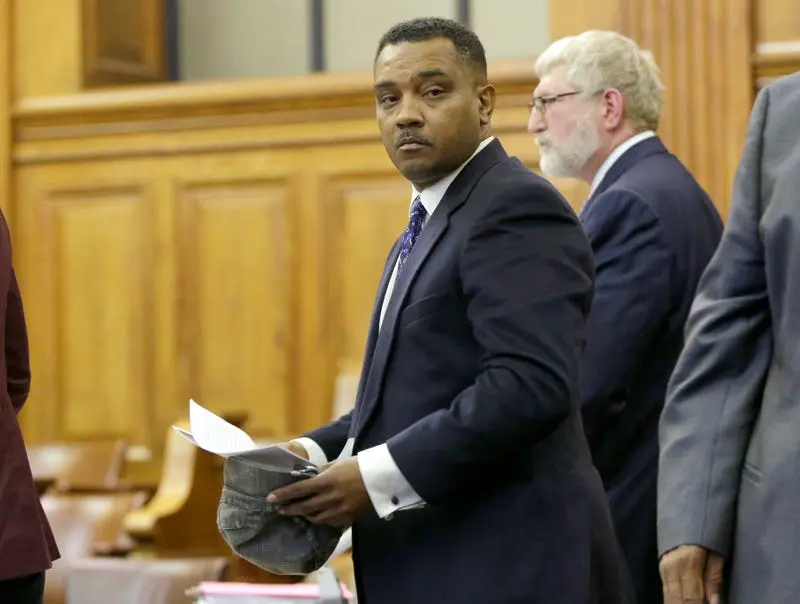
For example, the duplex on Vine Street: The six-bedroom, three-bathroom home was purchased by a company linked to Hoff for $37,000 at the height of the Great Recession in 2008. Advertisements online show the two units lease for about $750 per month, generating nearly $18,000 per year in rental income when fully occupied.
Rents in Milwaukee do not vary much between its poor and rich neighborhoods, said Yaidi Cancel Martinez, a housing researcher with the University of Wisconsin-Milwaukee. Decades of racially discriminatory housing and criminal justice policies mean that poor families and communities of color can find themselves trapped in a cycle: Often lacking generational wealth, such tenants are more likely to sacrifice a significant share of their income for rent, making them more vulnerable to eviction and subsequently ineligible for other apartments.
A 2019 study by Princeton University sociologist Matthew Desmond, author of the Pulitzer Prize-winning book “Evicted” about housing in Milwaukee, found that landlords in poor areas of the city profit more than those in wealthier parts because they are able to charge relatively high rents for cheap properties while deferring maintenance.
National research from UCLA economists earlier this year similarly found that profits for single-family rentals in the poorest ZIP codes are 2.5 times higher than those in the richest, even when accounting for the costs of evictions or vacancies.
The potential for profit has drawn interest from Wall Street investors who have discovered Milwaukee as a place to make money off desperate tenants.
Mike Gosman, executive director of the Milwaukee nonprofit Acts Housing, said its clients, usually low-income Black and Latino aspiring homeowners, are increasingly getting outbid by out-of-state corporate investors.
“What we see with investors is that they’re almost always making cash offers and not having any inspection contingencies,” Gosman said.
Reginald Reed, an entrepreneur in the construction industry who grew up on Milwaukee’s north side, said officials are not doing enough to protect renters from negligent landlords. He had one word for the city’s housing stock: “Trash.”
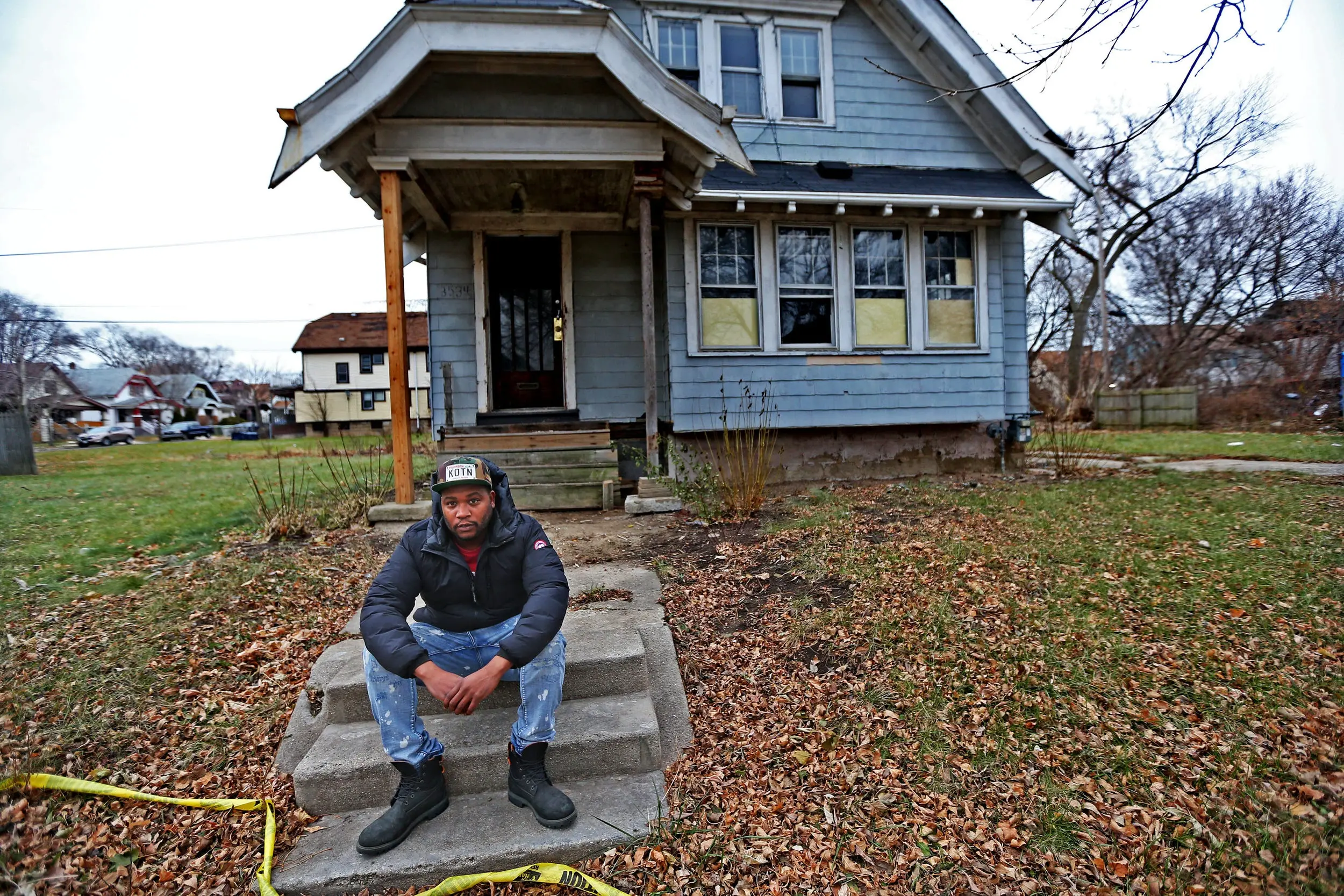
Many renters could become homeowners but are unable to because banks refuse to lend to them, and landlords continue to exploit them for profit, Reed said.
“How is it that the bank doesn't trust me with a $600 mortgage, but they trust me to pay the landlord $900?” Reed said. “Make it make sense.”
That’s why Reed launched an effort this year to increase home ownership on Milwaukee’s north side. His idea: buy 100 blighted homes and allow his staffing company’s trainees to use them for renovation practice. After the projects are done, the homes will be offered at below-market rate to the trainees who worked on them.
But Reed said he’s found little financial support from fellow business owners or city officials.
Meanwhile, proposals to strengthen renter protections have been opposed by landlord lobbying groups, which have argued that more enforcement would drive landlords out of business.
Heiner Giese, an attorney for the Apartment Association of Southeastern Wisconsin, agreed that profits can be substantial in poor neighborhoods but said that owners aren't always able to collect all the rent.
Kail Decker, a former assistant city attorney in Milwaukee who prosecuted negligent landlords and is now the West Allis city attorney, finds the plea of poverty by landlords hard to believe.

“Most landlords do have the money to fix their properties,” he said. “It’s just not money they want to spend.”
How the analysis was done
A Journal Sentinel analysis of rent assistance, housing violation and municipal court data revealed that taxpayer dollars regularly flow to landlords who fail to fix potentially hazardous electrical problems in rental homes.
The analysis relied on a limited subset of code violations in single- and two-family homes, and small slices of rent assistance data from 2018 to 2020, meaning that the actual problem is likely much larger.
To identify unsafe properties, reporters used two datasets of rent assistance obtained through public records requests and matched them with municipal court data and the city's Department of Neighborhood Services code violation data.
The first database covers tenant-based housing choice vouchers — widely known as Section 8 — funded by HUD and administered through the Milwaukee County Housing Division.
The other is a subset of two rent assistance programs authorized by the federal government during the COVID-19 pandemic and distributed by local community organizations. They are known as MRAP (Milwaukee Rental Assistance Program) and MERA (Milwaukee Emergency Rent Assistance).












